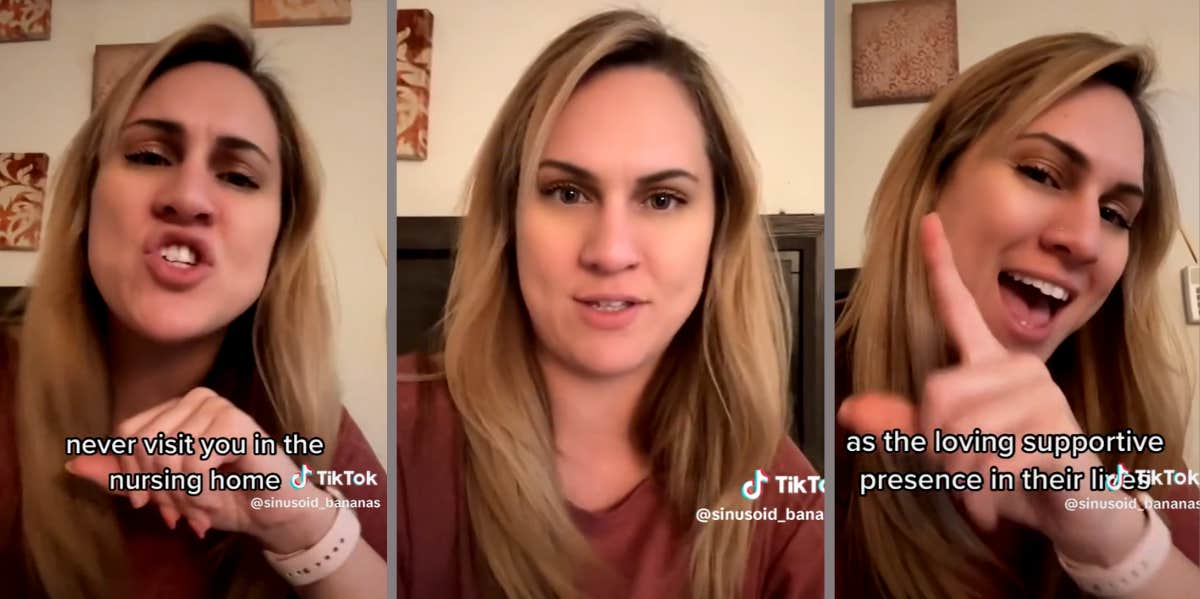Woman Tells People With Adult Children Who Don't Speak To Them That They Are At Fault — 'You Had One Job & You Failed At It'
She said that you had one job to do and failed miserably.
 @sinusoid_bananas - TikTok
@sinusoid_bananas - TikTok If you haven’t noticed yet, relationships between parents and their grown children have been falling apart more. Back in 1997 a study showed that 7% of adult offspring were estranged from their parents. By 2020, that number had risen to 25%, and the blame for those damaged relationships falls on the parent, according to a TikTok account called, “It’s My Emotional Support Wine”.
In a video viewed over 12 million times and liked 1.4 million times, the caption reads, “Yo, imagine being a parent whose adult children cut all ties to you. They don’t speak to you anymore. They don’t call you on your birthday.”
She says it's a parent's job to maintain a relationship with their kids, not the other way around.
She paints the scene, describing adult children who don’t call their parents on Mother’s or Father’s Day or keep them in the know about their grandkids, won’t visit their parents no matter how ill they get, or visit them in a nursing home.
The woman told viewers that the reason for such blatant disregard by a person you brought into the world is that “You failed so fantastically – so monumentally – at your one job” as a parent.
According to her, those parental failures did so horribly at raising children that their kids would rather “dethrone” you from the valuable and irreplaceable position you hold as a mom or dad.
She went on to say that those grown children have chosen to “voluntarily orphan” themselves over having a parent-child relationship with you.
The woman blames the abandoned parent’s “emotional immaturity” for their child’s choice to cut them out of their life permanently and says she could never be that type of parent.
As harsh as it sounds, viewers agreed with her and some even resonated with her words. The first comment was liked over 42,000 times and said, “I just realized the other day I was a self-made orphan and it’s so peaceful.” And another person followed that by saying, “And people will still be like, 'but she’s your mother!'”
There are two types of estrangements a child can have from their parents. One is continuous where the adult children can communicate with their mother or father but keep them at arm’s length no matter how much pressure they feel to get closer. Then there is chaotic disassociation where kids continue the on-again-off-again relationship.
But placing the blame on the parents may discount the many possible interactions that can lead to a disconnect between parent and child. There is no one kind of interaction that has been shown to be the root cause of adults choosing to separate from their guardians. As a matter of fact, if you ask the involved parties, each will likely believe the reason for the estrangement is something different due to nuances in how they interpret it.
Parents tend to think that a break in communication with their child is a result of divorce, them not approving of their children’s mates, or a sense of entitlement. But the adult children think that parents’ toxicity, mistreatment, abuse, neglect, or lack of love and support are to blame.
Some potential causes of separation could be mental illness, narcissism, judging, immaturity, differences in value, beliefs, or morals, abuse, neglect, rivalries, manipulation, dishonesty, entitlement, favoritism, drugs or alcohol, role reversals, and so on.
With so many potential problems, a blanket statement about who is at fault cannot be made. But as people who made a conscious decision to bring human life into this world, parents have a responsibility, when possible, to do all they can to repair the fractured relationship.
NyRee Ausler is a writer from Seattle, Washington. She covers lifestyle, relationship, and human-interest stories that readers can relate to and that bring social issues to the forefront for discussion.

